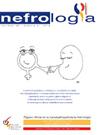Review and practical excursus on the comparison between traditional statics methods and Classification And Regression Tree (CART) in real-life data: Low protein diet compared to Mediterranean diet in patients with chronic kidney disease
IF 2
4区 医学
Q2 UROLOGY & NEPHROLOGY
引用次数: 0
Abstract
The Classification and Regression Tree (CART) is a supervised learning approach useful used to segment the space of and the predictors/features space into smaller homogeneous regions that are, represented in a decision tree. It computes the selection of features automatically, in contrast to traditional statistic methods. In this review, we compared CART to traditional statistics in patients who did not attempt a diet to patients who followed a low-protein diet (LPD) or the Mediterranean diet in chronic kidney disease (CKD) patients, and we analyzed them using linear regression and CART methods. In our example, diet adherence proved to be the factor with the greatest impact on renal function decline, but CART failed to detect significant differences between LPD and Mediterranean diet. Similar results were found using traditional statics, but CART gave a model with the proportion of the explained outcome by the model (R2) higher by about 20%, thus a stronger model. In addition, CART allows quick and easy identification of the variables affecting the outcome with a simple visual representation through the decision tree, increasing the interpretability of the results. In summary, no difference in the impact of variables has been detected with the two methods, but CART gave us a more detailed model with a faster and easier interpretation.
传统统计学方法与分类回归树(CART)在实际数据中的比较综述与实践:慢性肾病患者低蛋白饮食与地中海饮食的比较
分类和回归树(CART)是一种监督学习方法,用于将空间和预测器/特征空间分割成更小的同质区域,这些区域在决策树中表示。与传统的统计方法相比,它可以自动计算特征的选择。在这篇综述中,我们比较了没有尝试饮食的患者与遵循低蛋白饮食(LPD)或地中海饮食的慢性肾脏疾病(CKD)患者的CART与传统统计数据,并使用线性回归和CART方法对其进行分析。在我们的例子中,饮食依从性被证明是对肾功能下降影响最大的因素,但CART并没有检测到LPD与地中海饮食之间的显著差异。使用传统的静力学也得到了类似的结果,但CART给出的模型被模型解释结果的比例(R2)高出约20%,因此是一个更强的模型。此外,CART允许通过决策树通过简单的可视化表示快速轻松地识别影响结果的变量,从而增加结果的可解释性。综上所述,两种方法对变量的影响没有差异,但CART给了我们一个更详细的模型,更快更容易解释。
本文章由计算机程序翻译,如有差异,请以英文原文为准。
求助全文
约1分钟内获得全文
求助全文
来源期刊

Nefrologia
医学-泌尿学与肾脏学
CiteScore
3.40
自引率
7.70%
发文量
148
审稿时长
47 days
期刊介绍:
Nefrología is the official publication of the Spanish Society of Nephrology. The Journal publishes articles on basic or clinical research relating to nephrology, arterial hypertension, dialysis and kidney transplants. It is governed by the peer review system and all original papers are subject to internal assessment and external reviews. The journal accepts submissions of articles in English and in Spanish languages.
 求助内容:
求助内容: 应助结果提醒方式:
应助结果提醒方式:


